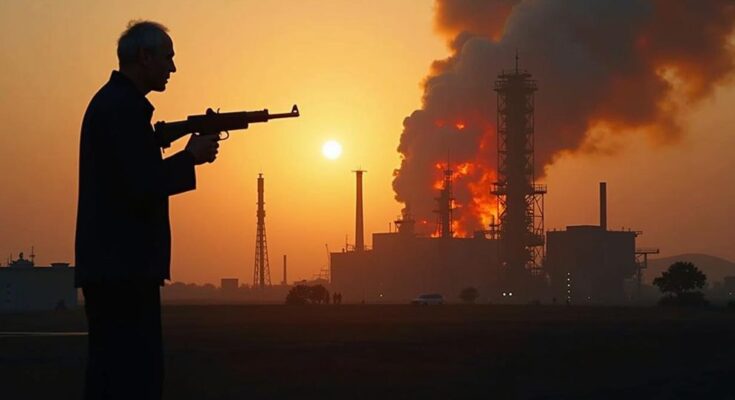President Biden has opposed any Israeli strikes on Iran’s nuclear facilities following Iran’s missile attack on Israel. He emphasized a need for a ‘proportional’ response while asserting ongoing U.S. support for Israel. Analysts are concerned that Israel might exploit the situation to target Iranian nuclear assets. The escalating tensions raise fears of potential wider conflict in the Middle East.
President Joe Biden has asserted his opposition to any potential Israeli strikes on Iran’s nuclear infrastructure in light of Tehran’s recent missile barrage targeting Israel. In response to an inquiry from reporters, Biden firmly stated, “the answer is no” when asked if he would endorse such military retaliation. Following Iran’s launch of approximately 180 ballistic missiles at Israel, which marks the second major assault on the country since April, Israeli Prime Minister Benjamin Netanyahu vowed that Iran would “pay” for this act. Although the missile strikes reportedly resulted in no significant casualties in Israel, they did claim the life of a Palestinian in the West Bank. Analysts have expressed concern that this situation may provide Israel with a pretext to conduct operations against Iran’s nuclear sites, a longstanding objective of Israeli leadership. Ali Vaez, the Iran Project director at the International Crisis Group, indicated that the likelihood of such an attack is heightened due to Iran’s diminished defensive support from Hezbollah, stating that this moment represents a rare opportunity for Israel to address what it perceives as an enduring threat from Iran. Former Israeli Prime Minister Naftali Bennett directly urged for an assault on Iran’s nuclear program, asserting that Israel possesses both the justification and the capability to proceed with such actions. Despite this, President Biden reiterated support for Israel while insisting that any response to Iran should be “proportional.” This stance aligns with views held by other G7 nations, which include Canada, France, Germany, Italy, Japan, and the United Kingdom. The White House has concurrently discussed the implementation of new sanctions against Iran. The situation remains precarious; Iran characterized its missile strikes as retaliation for the elimination of several key figures allied with Iran, including Hamas leader Ismail Haniyeh. Iranian officials claimed to be prepared for a conflict, stating that Israel would encounter “vast destruction” should it retaliate. The escalating tensions between these regional powers amidst ongoing conflicts in Gaza and Lebanon raise alarm over the potential for a broader regional war. Political analyst Marwan Bishara conveyed that an Iran-Israel conflict under the guise of U.S. support would provoke severe ramifications across the Middle East and beyond.
The ongoing tensions between Iran and Israel have been exacerbated by a series of military actions and counteractions. With Iran’s development of nuclear capabilities viewed by Israel as a significant threat, Israeli leaders have long contemplated strikes against Iranian nuclear facilities. The recent missile barrage from Iran comes amidst heightened instability in the region, as conflicts persist in neighboring Gaza and Lebanon. The United States has maintained a strategic alliance with Israel, thus complicating its diplomatic position regarding military strategies and responses to Iranian aggression. This recent escalation illustrates the delicate balance of power and the potential for a wider conflict in an already volatile region.
In summary, President Biden has clarified his opposition to Israeli military strikes on Iran’s nuclear sites, even amid escalated tensions following Iran’s missile attacks on Israel. The U.S. maintains its commitment to a proportional response, aligning with international allies, while also warning of severe consequences for Iran’s provocations. As both Iran and Israel navigate this precarious situation, the potential implications for wider Middle Eastern stability remain critical.
Original Source: www.aljazeera.com




